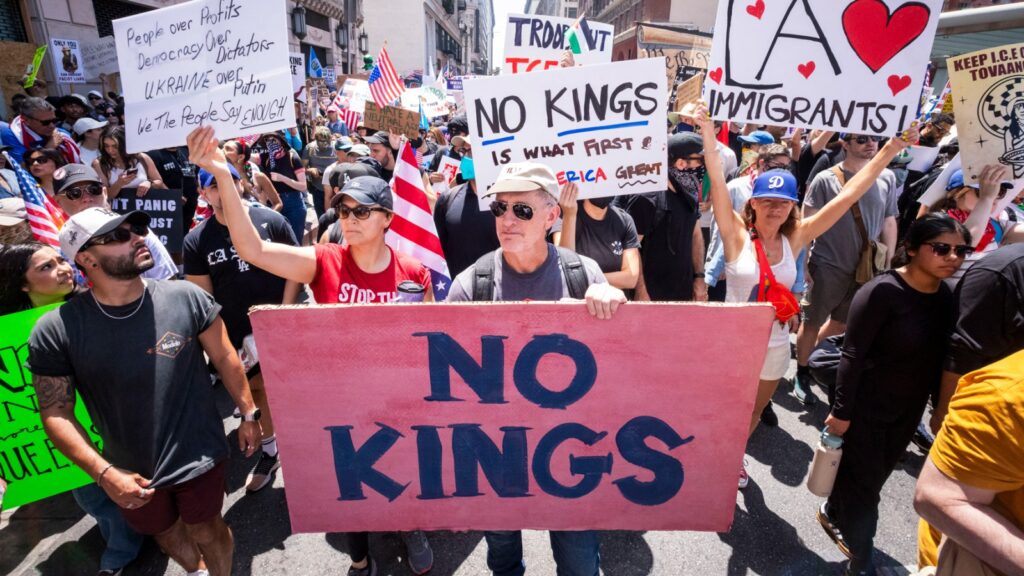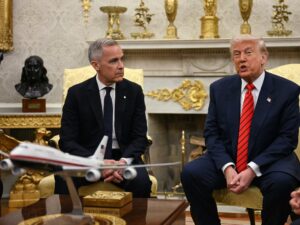
WASHINGTON, D.C. – In a historic demonstration, millions of Americans gathered to protest President Donald Trump’s perceived authoritarian tendencies, coinciding with his birthday parade on June 14. The “No Kings” protests spanned the nation, from major cities to small towns, creating one of the largest mass demonstrations in recent history.
Immediate Impact
The protests, organized to counter Trump’s military parade that featured tanks and helicopters, saw an estimated turnout of 5 to 7 million people. This far surpassed the attendance of the president’s event, which was also meant to celebrate the 250th anniversary of the Army.
5 to 7 million people participated in the “No Kings” protests, according to organizers and independent observers.
Key Details Emerge
During a celebratory call on Monday night, “No Kings” organizers announced plans to build a robust pro-democracy movement. This includes organizing mass protests, leadership training, and consumer boycotts.
Good Trouble Lives On
One significant initiative is a national protest dubbed “Good Trouble Lives On,” scheduled for July 17. This event honors the late Civil Rights icon John Lewis and encourages Americans to create “good trouble” in the fight for justice. The protest already boasts dozens of planned demonstrations nationwide.
1 Million Rising Initiative
Another major action is the “1 Million Rising” initiative, led by the progressive group Indivisible. This effort aims to train one million people to become leaders in the pro-democracy movement, equipping them with essential skills to mobilize others.
The mission of “1 Million Rising”: “1 Million Trained, Millions More Empowered.”
Industry Response
Consumer boycotts targeting Elon Musk and Tesla are gaining momentum. A protest named “Musk Must Fall,” organized by Tesla Takedown activists, is set for June 28. The activists are also pressuring T-Mobile to sever ties with Musk’s Starlink.
By the Numbers
- 2,000+ protests occurred across the U.S.
- 5 to 7 million estimated total protest participants
- Dozens of demonstrations planned for “Good Trouble Lives On”
What Comes Next
The movement’s future steps include leveraging the energy of the protests to foster long-term political power. Indivisible cofounder Ezra Levin emphasized the importance of channeling protest energy into sustainable movement-building efforts.
Levin criticized Trump’s parade as “dangerous” and “authoritarian,” praising the protesters for their resilience. “I’m proud to be in this movement with y’all,” he stated.
Background Context
The “No Kings” movement’s momentum has been fueled by recent events, including tragic incidents in Minnesota and Utah. The call also addressed these tragedies, underscoring the urgent need for continued activism.
According to Maria Stephan of The Horizons Project, consumer activism complements street protests by shifting corporate incentives away from supporting authoritarian regimes.
Expert Analysis
Experts like Stephan argue that consumer boycotts, such as those against Tesla and Target, play a crucial role in the movement. These actions aim to deter companies from supporting policies that undermine democracy.
The announcement comes as the movement seeks to broaden its reach and impact, engaging new activists and fostering collaboration among existing organizations.
Regional Implications
Organizers are launching weekly “host trainings” to support activists planning local demonstrations. This initiative aims to counter perceived attacks on civil and human rights by the Trump administration.
The timing is particularly significant as the movement aligns itself with the legacy of John Lewis, reinforcing its commitment to justice and democratic principles.
“March in Peace. Act in Power.” – Rallying cry for “Good Trouble Lives On”
As the “No Kings” movement evolves, its leaders remain focused on building a lasting coalition dedicated to defending democracy and human rights.






